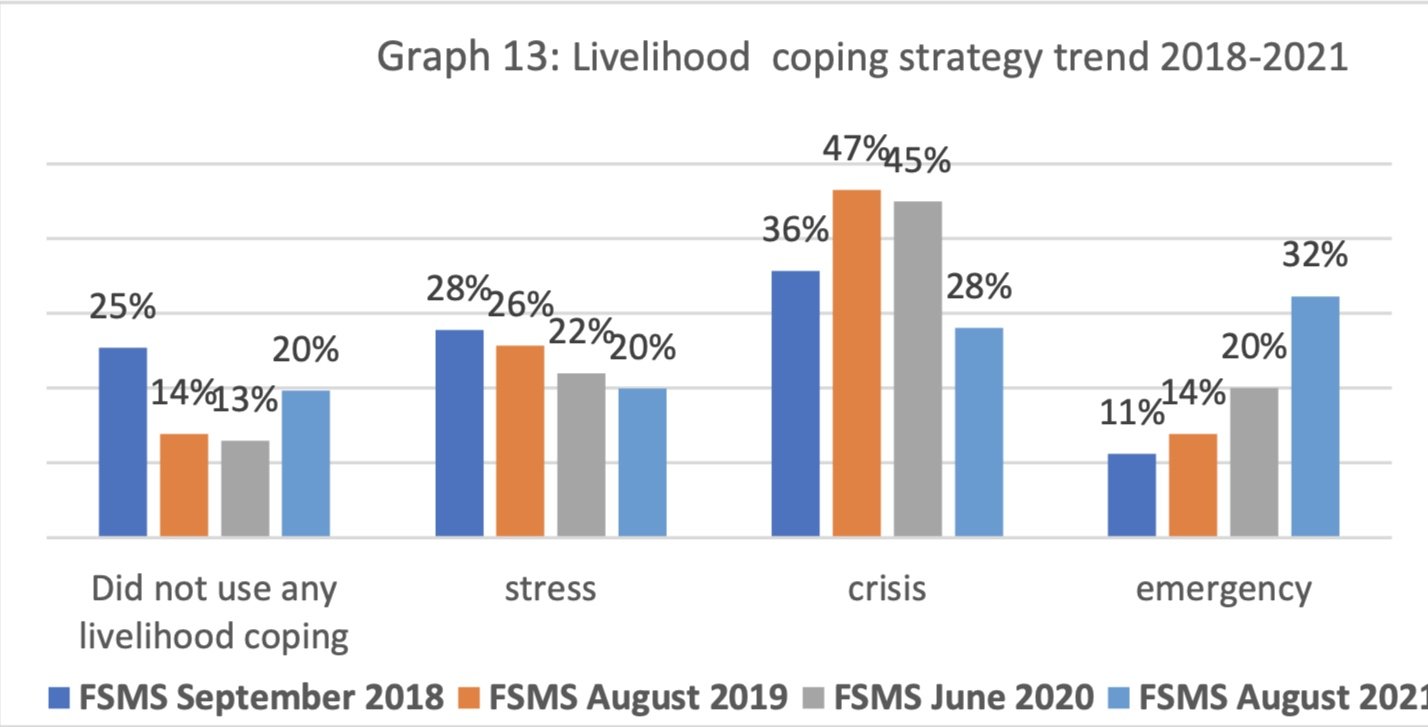One in three households in Sierra Leone forced to sell land, livestock, and beg as food insecurity worsens
More people in Sierra Leone are going hungry today than in 2018 because food prices keep going up, and agricultural yield is the same. While Covid-19 has worsened access to food, the trend began before the pandemic and peaked in 2019. According to the WfP’s latest Food Security Monitoring System Report which monitors food security and vulnerability across Sierra Leone a third of households are begging, selling off land and livestock just to put food on the table.
August 2021 - Food Consumption Score - WFP Food Security Monitoring Report
The report covered a sample size of 3,672 households randomly selected across all districts. Population weight was used for result generalization. The food security indicators used to interview participants include: Food consumption, Household expenditure on food, and Coping strategies.
Key Points from the report:
In 2018, only 11 percent of households used emergency coping strategies where they sold land, last female breeding stock, begged or ate their seed stocks, today 31 percent of households are coping with extreme food insecurity.
The proportion of households with “poor” Food Consumption doubled between September 2018 and August 2021. Those who are vulnerable to fall into the “poor” food consumption category increased from 37 percent in June 2020 to 42 percent in August 2021.
Households in Kenema, Tonkolili, Port Loko, and Falaba spend the most of their income on food, and are more likely to be living in a state of food insecurity.
August 2021 - Food Consumption Score - WFP Food Security Monitoring Report
August 2021 - Food Consumption Score - WFP Food Security Monitoring Report
Below are key recommendations made by WFP to Improve Food Security in Sierra Leone
A. Agricultural value chain strengthening
With over three-quarters of households in Sierra Leone engaged in farming, scaling up and strengthening the quality of agricultural support provides the most sustainable way to reduce food insecurity. Potential investments could include:
Ensure availability of affordable and quality inputs for farmers
Supporting farmers to have timely access to improved seeds and organic fertilizer will enable them to increase cropping cycles and yields. Seed support should focus on nutritious leguminous and vegetable crops to increase availability of nutrient dense foods and promote
dietary diversification.Training of farmers in nutrition-sensitive agriculture for improved nutrition
Given the seasonal dynamics of food insecurity shown by the August 2021 FSMS, there is a need to expand production of nutritious food crops during the rainy season and increase consumption. This could be achieved through training farmers, particularly Mother Support Group members and youth, in nutrition-sensitive agriculture and improved eating habits. Training should be implemented in alignment with seasonality and combined with improved access to inputs.
iii. Affordable solar energy to support agricultural modernisation
Limited rural electrification is both constraining agricultural production and increasing post-harvest losses. Provision of solar water pumps could enable farmers to increase production of nutritious food crops during the dry season, whilst investing in cold storage will allow farmers, particularly women, to increase the shelf life and quality of their vegetables after harvest, reducing losses.
iv. Linking local produce to markets
Increasing smallholder production of nutritious food crops could be further supported through linking local produce to sustainable markets. A viable option is scaling up the National School Feeding Programme using a homegrown approach, prioritizing the purchase of locally produced nutritious foods. This is in support of the National School Feeding Policy and will enhance the implementation of the flagship Free and Quality Education initiative at a critical time for children from food insecure households.
V. Transforming agricultural extension
Huge and rapid gains in agricultural production could be achieved through adoption of improved practices by farmers. However, the agricultural extension system is under-resourced, making it hard to
meet needs. Talented young and female agriculturalists could be enrolled as extension workers to cost- effectively increase outreach and encourage greater participation of women and youth in agriculture.
B. Expanding safety nets
Social safety nets for extremely poor households
Increasing food prices have accentuated the food insecurity of chronically poor households and have compromised the fragile support networks that they rely upon. There is thus a need to scale-up cash assistance to extremely poor households, ensuring that the level of support is closely monitored to be responsive to further price increases.Developing irrigation systems with cash support
Effectively addressing the seasonal characteristics of food insecurity requires transforming Sierra Leone’s agricultural production system. Most prevalent upland rainfed production systems constrain the potential production of Sierra Leone’s smallholders. Assisting youth and women with cash to engage in labour intensive development of irrigation systems to utilize Inland Valley Swamps could support this transition.
With no end to the pandemic in sight government of SL needs to reallocate resources to safeguard extremely poor families in the worst hit districts. In a country of so much abundance citizens should not go hungry.
Download the Sierra Leone Food Security Monitoring System Report August 2021








